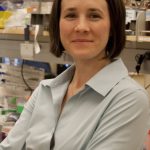Good Morning America: A push to end racial disparities in cancer research
Read moreState: Utah
Eric Snyder, M.D., Ph.D.
Cancer treatment is being improved by ever more specific drugs. But, there is growing proof that cancers growing in different parts of the body do not react to the same drugs, even if the tumor has the same mutation. For example, a lung tumor may respond when given a drug, but a tumor with the same mutation from another part of the body may not react in the same way. Some lung tumors can look a lot like healthy lung tissue, but some look like a completely different tissue. My lab has developed a mouse model of lung cancer that lets us change the state of the tumor from looking like one from the lungs to the stomach. We have shown that this change can happen in human lung cancer too. We will see if this change affects how lung tumors respond to targeted therapy. We will then use this knowledge to improve lung cancer treatment.
Michelle Mendoza, Ph.D.
Funded by the Stuart Scott Memorial Cancer Research Fund
The most common cause of cancer-related sickness and death is cancer spread throughout the body. Cells become cancer when they have too many changes. In order to stop the effects of these changes, we need to know more about what causes them. My lab is characterizing the cell changes that effect cancer spread in lung and head and neck cancer. This work will help identify the specific changes that could be targeted in new treatments to improve patient well-being and survival.







